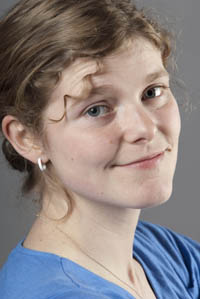First Fulbright Scholar
 |
|
| Liz Davis Maxfield '09 | |
| Photo by Phil Farnsworth |
Liz Davis Maxfield missed her mother, Kira, an Irish harpist and singer who passed away when Liz was only 10. In an effort to feel her mother's presence, young Liz began playing her music on the cello, which she had started playing a year before. The fact that she'd never heard of a folk cellist didn't matter. No one told her it couldn't be done.
Now 22 and a 2009 Berklee graduate, Maxfield has become the first Berklee student to be named a Fulbright scholar. In September she will head to the University of Limerick in Ireland to continue the search for her own musical home.
Maxfield's experimentation began with Fiddlesticks, her family's Celtic band. Based in Maryland and then in Utah, the group played more than 50 concerts a year. "For one of my first performances, I still had tape on my cello to see where I should play," she recalls.
She took instruction in classical music, but for the Fiddlesticks repertoire she didn't have much to go on. Scottish music occasionally featured her instrument-in the 1700s, Maxfield says. But in Irish music, it was unheard of.
So she started cobbling together her own style. Since the fiddle usually plays the melody, she learned to play bass lines. She also started strumming basic chords and plucking the strings, making it up as she went along. In her late teens, she discovered a burgeoning group of nonclassical cellists, headed by jazz-oriented Eugene Friesen. She went to music camp and took a few workshops on new techniques.
Soon afterward, she entered Brigham Young University to study classical cello, but the possibilities outside classical music excited her. She turned to Berklee, where she could study many genres. And the fact that Friesen is a Berklee faculty member was a major draw, Maxfield says.
At Berklee, Maxfield immersed herself in the college's alternative-folk string world. The String Department is "such a tight-knit community," Maxfield says, and "seems like it's doubling every semester. It's really amazing to see so many people interested in it-so many high-caliber people."
That number includes Maxfield. Assistant Professor Natalie Haas, a Scottish-style cellist, says Maxfield's music is genuinely innovative. "You can count the people who are doing this on your two hands." Haas praises Maxfield's beautiful tone and rock-solid rhythm, and her ability to combine her classical foundation with the signature Berklee multigenre mélange-or a capability that Haas terms "being multilingual on your instrument."
"It's really fun to be at the forefront of this cello movement where there's so much room to explore," Maxfield says. Career-wise, it's also useful. "Because the music industry is changing so rapidly, I think a niche is the only way to make a career for yourself," she says.
As Maxfield sped toward graduation in the spring of 2009, she had far more on her plate than most Berklee seniors. At her senior recital, she released her Big Fiddle recording that features her folk-inspired originals including the song "New Time," that she arranged in a hybrid style she calls "ChamberGrass." As she looked toward her future, Maxfield thought about how she had never been to Ireland. In an airport, she ran into a friend who was studying Irish dance at the University of Limerick. Later, while leafing through a pamphlet on the Fulbright Scholar Program, Maxfield found a page on Ireland that encouraged musicians to apply. And she did. When the acceptance letter came on April 6, she cried.
After completing five semesters at Berklee, Maxfield is excited about developing a more pure voice in Irish music and drinking from the stream at its source. Of all the genres she's studied, nothing captures her heart like Irish music. "I just really think it's beautiful," she says. "It's the type of music that really speaks to me."
At the University of Limerick, Maxfield will be a pioneer as the university's first traditional cellist. In addition to earning a master's degree, she will record podcasts and write a book on applying Celtic performance techniques to the cello.
But sharing discoveries isn't a side project for Maxfield. "I have a passion for teaching," Maxfield says. She currently has several private students and hopes to pursue a dual career in teaching and performing. With such unique talents, she's sure to have a line waiting-at both the box office and the rehearsal room-when she returns from éire.
